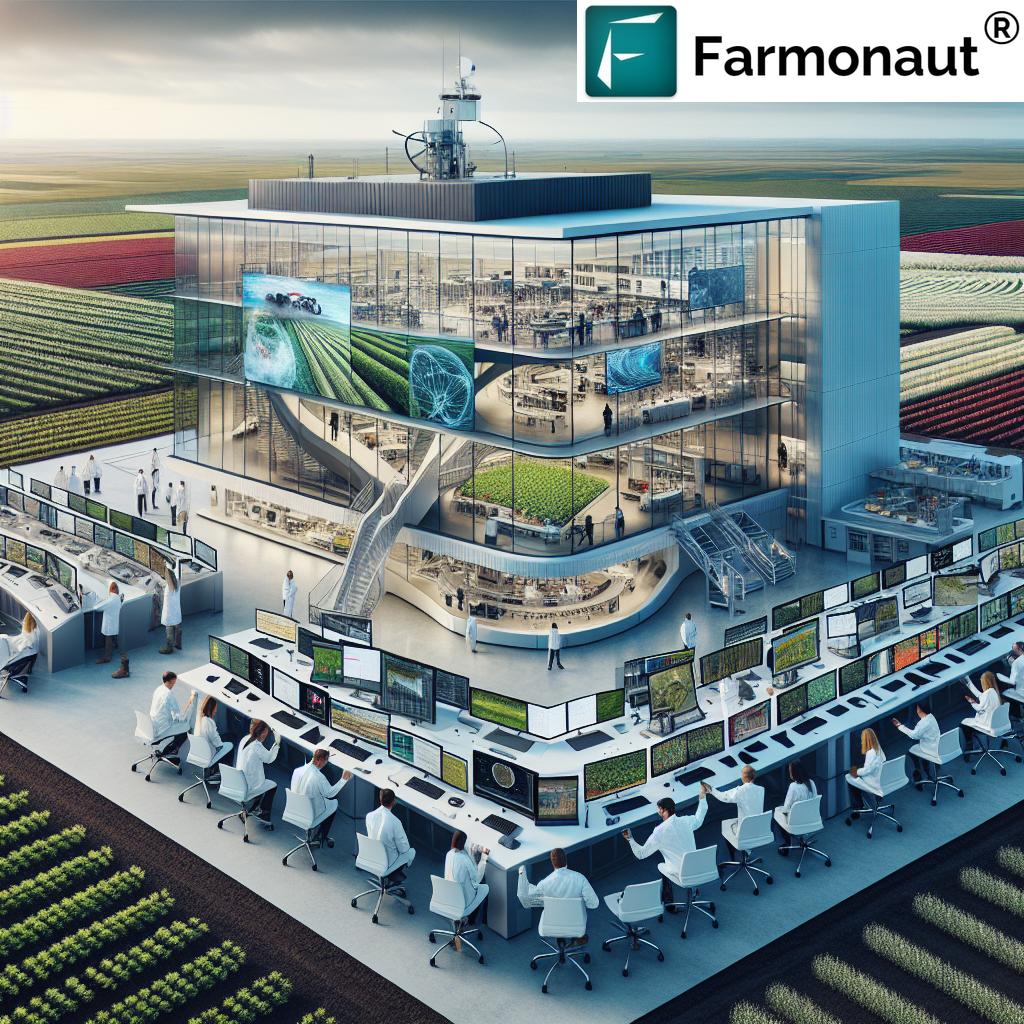Unleashing Nebraska’s Agricultural Potential: Digital Farming and GIS Innovations at UNL’s Agronomy Department
“UNL’s Agronomy Department collaborates on over 50 precision agriculture projects annually, advancing digital farming technologies.”
Welcome to the cutting-edge world of agronomy and horticulture at the University of Nebraska-Lincoln (UNL). As we delve into the realm of digital farming and Geographic Information Systems (GIS) innovations, we invite you to explore the groundbreaking research and educational opportunities available at our esteemed institution. In this comprehensive guide, we’ll uncover the latest advancements in agricultural technology, sustainable farming practices, and the future of smart farming solutions that are shaping Nebraska’s agricultural landscape.

The Future of Agriculture: Digital Farming Technologies
At UNL’s Agronomy and Horticulture Department, we’re at the forefront of integrating digital farming technologies into traditional agricultural practices. Our research focuses on leveraging cutting-edge tools to enhance crop yields, optimize resource utilization, and promote sustainable farming methods.
- Precision Agriculture Techniques: We’re pioneering the use of sensor technologies, GPS-guided machinery, and data analytics to enable site-specific crop management.
- GIS in Agriculture: Our state-of-the-art GIS lab allows students and researchers to analyze spatial data, creating detailed maps of soil properties, crop health, and yield patterns.
- Smart Farming Solutions: We’re developing AI-driven decision support systems that help farmers make informed choices about planting, irrigation, and harvesting.
These digital farming technologies are not just theoretical concepts at UNL; they’re being actively implemented and refined through our extensive network of research farms and field trials across Nebraska.
Agricultural Research Opportunities at UNL
Our department offers a wide array of research opportunities for both graduate and undergraduate students. We believe in hands-on learning experiences that prepare our students for the challenges of modern agriculture.
- Crop Science Innovations: Students work on developing new crop varieties that are more resilient to climate change and pests.
- Sustainable Farming Practices: Research projects focus on conservation tillage, cover cropping, and integrated pest management techniques.
- Agtech Advancements: Collaborations with engineering departments lead to the development of new agricultural machinery and robotics.
These research opportunities not only contribute to scientific knowledge but also have real-world applications that benefit Nebraska’s farmers and the global agricultural community.
Agronomy and Horticulture Graduate Programs
Our graduate programs are designed to cultivate the next generation of agricultural leaders. We offer both Master’s and Ph.D. programs that combine rigorous coursework with practical research experience.
- Specializations: Students can focus on areas such as crop physiology, plant breeding, soil science, or precision agriculture.
- Interdisciplinary Approach: We encourage collaboration across departments, including natural resources, computer science, and agricultural economics.
- Industry Partnerships: Our strong ties with agribusinesses provide students with internship opportunities and exposure to real-world challenges.
Graduate students at UNL benefit from access to cutting-edge facilities, including our advanced GIS lab, plant transformation center, and the Nebraska Innovation Campus.
Undergraduate Opportunities in Agronomy and Horticulture
We’re committed to nurturing undergraduate talent and preparing students for successful careers in agriculture. Our undergraduate programs offer:
- Scholarships: Numerous financial aid opportunities are available for promising students.
- Transfer Programs: Seamless integration for students transferring from community colleges or other institutions.
- Online Learning Options: Flexible course offerings that cater to diverse student needs and schedules.
Undergraduate students also have the opportunity to participate in research projects, gaining valuable experience that sets them apart in the job market.
“Nebraska’s agricultural sector contributes approximately $25 billion to the state’s economy, with UNL research playing a crucial role.”
State-of-the-Art Facilities and Equipment
At UNL, we pride ourselves on providing students and researchers with access to the latest agricultural technology and equipment. Our facilities include:
- High-Tech Greenhouses: Climate-controlled environments for year-round plant research.
- Precision Planting Equipment: GPS-guided tractors and planters for accurate field trials.
- Drone Technology: UAVs equipped with multispectral cameras for crop monitoring and analysis.
- Data Processing Centers: Powerful computing resources for big data analytics in agriculture.
These facilities not only support our research efforts but also provide students with hands-on experience using the tools they’ll encounter in their future careers.

Agricultural Extension Services and Outreach
Our commitment to Nebraska’s agricultural community extends beyond campus through our robust extension program. We provide:
- Educational Workshops: Regular training sessions on the latest farming techniques and technologies.
- Field Days: Opportunities for farmers to see research in action and learn about new crop varieties.
- Online Resources: A wealth of information accessible to farmers and agribusinesses across the state.
Through these extension services, we ensure that the latest research findings and agricultural innovations reach those who can benefit from them most directly.
Comparative Analysis of Digital Farming Technologies at UNL
| Technology Name | Primary Application | Benefits to Agriculture | UNL Research Focus | Estimated Adoption Rate (%) |
|---|---|---|---|---|
| GIS/Remote Sensing | Spatial data analysis and mapping | Improved crop monitoring and land use planning | Integrating satellite data with ground-based sensors | 75 |
| Precision Agriculture Tools | Site-specific crop management | Optimized resource use and increased yields | Developing variable rate application algorithms | 60 |
| IoT Sensors | Real-time environmental monitoring | Early detection of crop stress and disease | Creating low-cost, scalable sensor networks | 40 |
| AI/Machine Learning Algorithms | Predictive analytics for farm management | Data-driven decision making and forecasting | Developing crop yield prediction models | 30 |
| Drone Technology | Aerial imaging and crop scouting | Rapid assessment of large agricultural areas | Automating image processing for crop health analysis | 50 |
Innovative Approaches to Sustainable Farming
At UNL, we recognize the importance of developing sustainable farming practices that balance productivity with environmental stewardship. Our research initiatives focus on:
- Water Conservation: Developing drought-resistant crop varieties and precision irrigation systems.
- Soil Health: Investigating cover cropping and no-till practices to improve soil structure and fertility.
- Integrated Pest Management: Creating biological control methods to reduce reliance on chemical pesticides.
- Carbon Sequestration: Exploring agricultural practices that increase soil carbon storage and mitigate climate change.
These sustainable farming practices not only benefit the environment but also help farmers reduce input costs and improve long-term productivity.
Collaborations and Partnerships
Our department thrives on collaborations that drive innovation in agriculture. We work closely with:
- Other UNL Departments: Interdisciplinary projects with computer science, engineering, and natural resources.
- Research Institutions: Partnerships with USDA-ARS and other land-grant universities.
- Private Sector: Collaborations with agribusinesses to test and refine new technologies.
These partnerships ensure that our research remains relevant and applicable to real-world agricultural challenges.
The Role of Big Data in Agriculture
Big data analytics is revolutionizing agriculture, and UNL is at the forefront of this transformation. Our research focuses on:
- Data Collection: Utilizing IoT devices and sensors to gather vast amounts of agricultural data.
- Data Analysis: Developing algorithms to process and interpret complex datasets.
- Predictive Modeling: Creating tools that forecast crop yields, pest outbreaks, and market trends.
By harnessing the power of big data, we’re helping farmers make more informed decisions and optimize their operations.
The Future of Agronomy and Horticulture Education
As we look to the future, UNL’s Agronomy and Horticulture Department is committed to evolving our educational programs to meet the changing needs of the agricultural sector. We’re focusing on:
- Curriculum Innovation: Integrating emerging technologies and sustainable practices into our courses.
- Experiential Learning: Expanding opportunities for internships and hands-on research experiences.
- Global Perspective: Preparing students to address agricultural challenges on a global scale.
Our goal is to produce graduates who are not only technically proficient but also critical thinkers and problem solvers ready to tackle the complex challenges facing modern agriculture.
Engaging with the Agricultural Community
UNL’s Agronomy and Horticulture Department is deeply committed to serving Nebraska’s agricultural community. We actively engage through:
- Field Workshops: Practical demonstrations of new farming techniques and technologies.
- Agricultural Seminars: Regular presentations on cutting-edge research findings.
- Farm Tours: Opportunities for farmers to visit our research facilities and learn about ongoing projects.
- Online Resources: Webinars, podcasts, and digital publications that make our research accessible to all.
This engagement ensures that our research directly benefits those working in agriculture across the state.
The Impact of Climate Change on Agriculture
Climate change poses significant challenges to agriculture, and our department is at the forefront of developing adaptive strategies. Our research in this area includes:
- Climate-Resilient Crops: Breeding varieties that can withstand extreme weather conditions.
- Adaptive Management Practices: Developing farming techniques that respond to changing climate patterns.
- Carbon Footprint Reduction: Investigating ways to minimize greenhouse gas emissions from agricultural activities.
By addressing these challenges head-on, we’re helping to ensure the long-term sustainability of agriculture in Nebraska and beyond.
Diversity and Inclusion in Agricultural Education
At UNL, we believe that diversity strengthens our academic community and enriches the field of agriculture. We’re committed to:
- Inclusive Recruitment: Actively seeking out students from diverse backgrounds.
- Supportive Environment: Creating a welcoming atmosphere for all students, faculty, and staff.
- Cultural Competence: Integrating global perspectives into our curriculum and research.
Our goal is to prepare a diverse workforce ready to address the complex challenges of global agriculture.
Frequently Asked Questions
- Q: What are the admission requirements for UNL’s Agronomy and Horticulture graduate programs?
A: Admission requirements typically include a bachelor’s degree in a related field, GRE scores, letters of recommendation, and a statement of purpose. Specific requirements may vary by program. - Q: Are there opportunities for international students in these programs?
A: Yes, we welcome international students and offer various support services to help them succeed in our programs. - Q: How can I learn more about UNL’s research in digital farming technologies?
A: You can explore our department website, attend our seminars (many of which are available online), or contact our faculty directly for more information. - Q: Are there internship opportunities available for undergraduate students?
A: Yes, we offer numerous internship opportunities with both on-campus research projects and industry partners. - Q: How does UNL’s Agronomy Department collaborate with local farmers?
A: We collaborate through our extension programs, field days, workshops, and by conducting on-farm research trials.
Conclusion
The University of Nebraska-Lincoln’s Agronomy and Horticulture Department stands at the forefront of agricultural innovation, combining cutting-edge research with practical education to address the challenges facing modern agriculture. From digital farming technologies to sustainable practices, our programs are shaping the future of farming in Nebraska and beyond. We invite you to explore the opportunities available at UNL and join us in revolutionizing agriculture for the 21st century.
For those interested in leveraging technology for agricultural advancement, we recommend exploring solutions offered by companies like Farmonaut. Their satellite-based farm management tools complement the research and education we provide at UNL.
Explore Farmonaut’s agricultural technology solutions:
For developers interested in agricultural APIs:
Download Farmonaut’s mobile apps:






